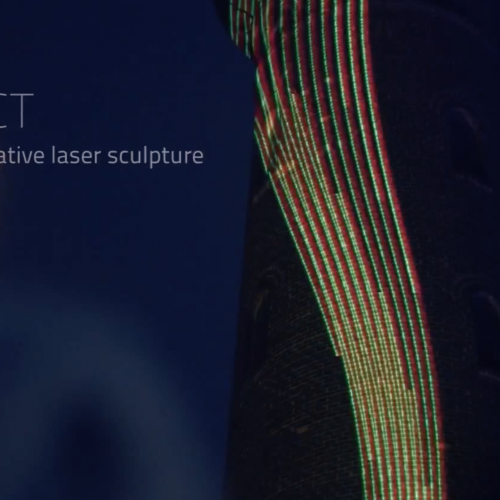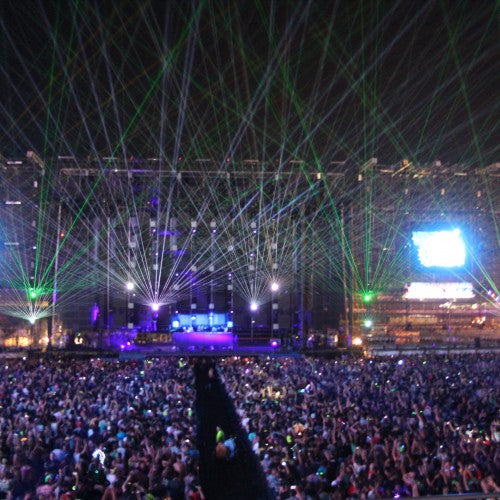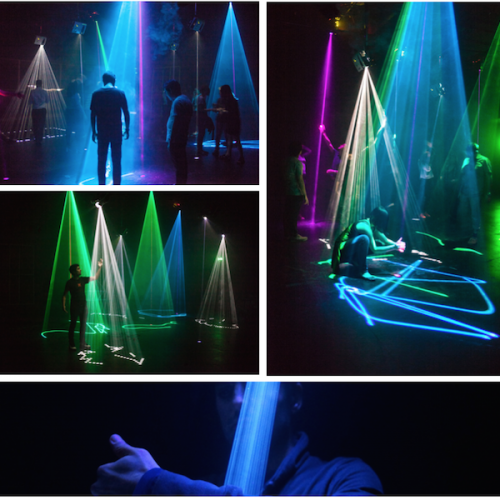Over the past few years, laser entertainment technology has undergone incredible changes, with new improvements in laser technology helping to drive the industry forward. Laser projectors have become significantly more affordable to purchase and maintain, primarily due to advancements in the laser sources used. And laser control technology from companies like Pangolin has made the process of creating incredible laser displays easier than ever. As a result of these technological improvements, lasers have rapidly become an integral part of many high-profile entertainment venues and events, and we’re now seeing laser technology being used in other new and exciting applications.
One new area we see lasers expanding into, is “Interactive Entertainment Displays”, sometimes referred to as “Crowd Art”. An Interactive Entertainment Display is essentially an installation whereby people in an audience have the opportunity to control, manipulate and in some cases touch an effect. These are becoming increasingly popular, especially in public outdoor areas where there is a desire to captivate an audience.
A recent installation called LASACT held in Cologne, Germany for the “Platine Festival and “ArtApp Awards” is a great example of how lasers are being used for Interactive Entertainment Displays and media art.
Created by BTF Team (http://btf.de), including Alexander Rechberg, David Murmann, Michael König, Adrian Rennertz, and Daniel Becker… LASACT is an interactive light and sound-installation, where visitors are able to modify the visual appearance and sound patterns of a laser display, using a web application for their mobile device.
The installation uses a variety of state-of-the-art web and laser technologies to accomplish this feat, including RGB Laser Projection Systems, Pangolin’s LD2000 software, QM2000.NET hardware and software development kit, as well as “PangOSC” which is an OSC-Wrapper for the Pangolin API written by Thomas Kuleßa.
LASACT allows for fun, mesmerizing, harmonious lines to intertwine with each other, while visitors take control of the laser installation. Visitors can interact with the display on their own, but the real magic happens when they collaborate with others in the audience, to create beautifully projected effects that are the result of mutually coordinated input. All of this is possible using a wide-spread technology we commonly carry in our pockets – a smart phone.
In an interview with the BTF Artistic Team, they noted… “Nowadays brief moments of absence – induced and facilitated by the smart phone technology – are accepted even during face to face meet-ups. Despite being connected globally, members of today’s society escape the real world and dive into their own virtual bubbles. The LASACT installation conveys these aspects of communication, social relation and group dynamics.
LASACT was awarded the “AppArtAwards” best creative development in the field of “crowd art” at the Center for Art and Media, Karlsruhe (ZKM). The sponsors for the awards ceremonies were CAS Software AG, the German Federal Ministry of Education and Research as part of the Science Year 2014 – The Digital Society, DPS Engineering and GFT Technologies AG.
“LASACT emphasizes the collaborative creation; it is an artwork in constant progression, a creation which is created just now, only during the time of performance, and in a non -repeatable matter” says Chiara Passa, Artist and Member of the voting panel.The LASACT installation serves as a great example of how laser technology is pioneering the way for Interactive Entertainment Displays, presenting new and exciting opportunities for the laser entertainment industry as a whole.
A big thank you to Alexander Rechberg, David Murmann, Michael König, Adrian Rennertz, and Daniel Becker of BTF GmbH for their outstanding work in coordination with this installation.
Technical Specifications for Future Installations:
Projection by 3.0W RGB LaserInstallations & Local Wifi
One Computer running:
* Local HTTP Server (receiving input of the mobile phones)
* Graphical Content Generation Engine
* PureData Setup for Sound-generation
Second Computer:
* Laser input signal computation (Pangolin Laser Systems’ LD2000 software, QM2000.NET hardware, and Software Development Kit)
All electronic and technical hardware required may be supplied by the artist. Transportation is possible via plane or car.
To be Supplied by the Venue:
* Tripod or Rack for rigging of the laser projector at a minimum height of 2,5m (safety reasons)
* Power (at least 1,5 kW)
Optional:
* Stereo speakers
* Internet connection




